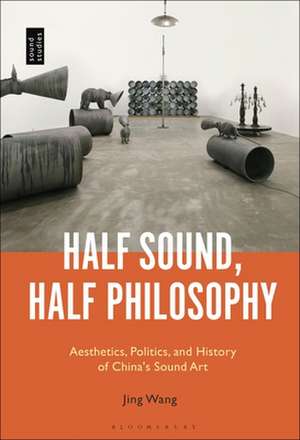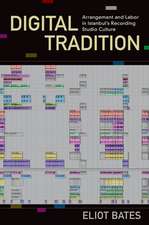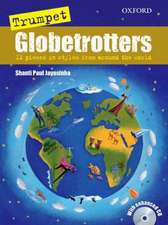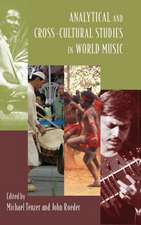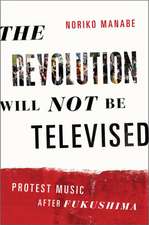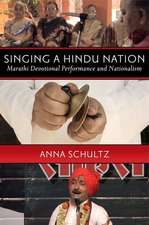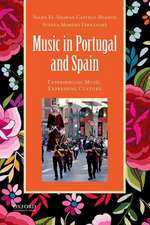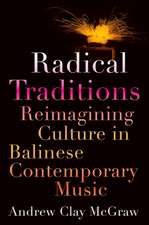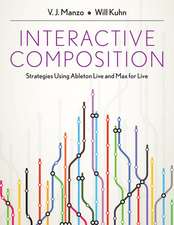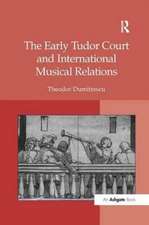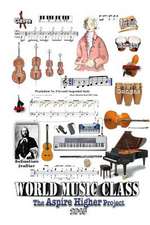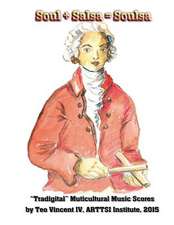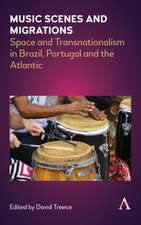Half Sound, Half Philosophy: Aesthetics, Politics, and History of China's Sound Art
Autor Professor Jing Wangen Limba Engleză Hardback – 10 feb 2021
| Toate formatele și edițiile | Preț | Express |
|---|---|---|
| Paperback (1) | 197.34 lei 6-8 săpt. | |
| Bloomsbury Publishing – 24 aug 2022 | 197.34 lei 6-8 săpt. | |
| Hardback (1) | 568.48 lei 6-8 săpt. | |
| Bloomsbury Publishing – 10 feb 2021 | 568.48 lei 6-8 săpt. |
Preț: 568.48 lei
Preț vechi: 815.76 lei
-30% Nou
Puncte Express: 853
Preț estimativ în valută:
108.78€ • 113.57$ • 90.03£
108.78€ • 113.57$ • 90.03£
Carte tipărită la comandă
Livrare economică 05-19 aprilie
Preluare comenzi: 021 569.72.76
Specificații
ISBN-13: 9781501333484
ISBN-10: 1501333488
Pagini: 232
Dimensiuni: 152 x 229 mm
Greutate: 0.48 kg
Editura: Bloomsbury Publishing
Colecția Bloomsbury Academic
Locul publicării:New York, United States
ISBN-10: 1501333488
Pagini: 232
Dimensiuni: 152 x 229 mm
Greutate: 0.48 kg
Editura: Bloomsbury Publishing
Colecția Bloomsbury Academic
Locul publicării:New York, United States
Caracteristici
Presents insight into the aesthetic, technological, and ideological connections between sound practices in China, Japan, Europe, and the United States
Notă biografică
Jing Wang is Associate Professor in the College of Media and International Culture at Zhejiang University, China. She is an art anthropologist, sound studies scholar, sound event curator. She completed her PhD in the school of Interdisciplinary arts at Ohio University. She was a visiting professor at MIT anthropology (2019-2020). Artistically, Jing (Adel) works with field-recordings and installation-based performance. In January 2015, she founded The Sound Lab at College of Media and International Culture at Zhejiang University.
Cuprins
AcknowledgementsList of IllustrationsIntroduction1. Sound, Resonance, the Philosophy of QiAncient Chinese AcousticsThe Philosophy of QiSound Explained Through Qi-PhilosophyConclusion2. A Brief History of Sound in China's Contemporary Art Conditions and Precursors New Media Art After 2000 Sound Art after 20003. A Brief History of Electronic and Experimental Music in China The Electronic Instrument Builders Academic Electronic Music: Inauguration Non-Academic Electronic and Experimental Music Conclusion4. Shanshui-Thought in Experimental Music Practice Shanshui-Thought: An Overview Shanshui: The Existential and the Epistemological Making Shanshui-Thought Audible: Two Aesthetic QualitiesConclusion 5. In Praise of Strange Sounds of the Shamanistic The Minor Tradition in Ancient Chinese Culture: Shamanism and Chimei Wangliang Acoustic Cultural Heritage and NationalismHuanghu and Its Two Aesthetic Operations of Resonance and WithdrawalConclusion6. Ubiquitous Control: From Cosmic Bell, Loudspeakers to Immanent Humming Zhang Peili and Anti-monumentality of Sound Zhang Ding and the Military-entertainment-art Complex Liu Chuang and the (Im)Possibility of Not Being Governed Conclusion: Qi-Thinking, or Cybernetics: A way of Going OnGlossary of TermsBibliographyIndex
Recenzii
In this book, WANG Jing offers the reader the unique opportunity to investigate sonic creativity within but mainly outside of academe in China ranging from sound art to experimental and electroacoustic music to DIY culture and electronic instrument building. The historical discussion covers much ground but is not restricted to a multi-strand survey. Key to her approach is the investigation of Chinese cultural and philosophical elements that permeate this substantial body of creative work demonstrating beyond any doubt that experimentalism with sound in China is hardly a simple reflection of developments from other, mainly western countries but is instead largely deeply rooted in Chinese traditions, some ancient, related to sound, to qi and much more.
If sound is qi, resonating, Chinese sound art animated by qi lives in the resonances that arise in the mutating, overlapping atmospheres of state power plays and works of artistic resistance. In this stunning book, Jing Wang audits pieces that mobilize clock hearts, crowd shouts, cybernetic dissonance, and strategic silence to jolt us into an active attention to how violence and defiance are made and born in the ambient sounds of everyday life.
Half Sound, Half Philosophy is the first major study of Chinese sound art and its affinity to ancient Qi-philosophy, an organic, holistic and enchanted worldview that stands in marked contrast to the commercialism and individualization of post-Mao China. Erudite and being attuned to the subtle play of resonances and the subliminal in the acoustics of Qi, Wang's book is destined to become a classic of sound art scholarship and sound studies more broadly.
Wang's timely publication is a must read for anyone interested in a transnational perspective on sound.
Half Sound, Half Philosophy contributes a uniquely ambitious and essential entry into the emerging literature on sound in East Asia. Wang's rich scholarly analysis extends the core tenets of qi as acoustical thought into a contemporary history of electronic music and sound artists, revealing the deep roots of sonic philosophy in Chinese conceptual and creative practices.
If sound is qi, resonating, Chinese sound art animated by qi lives in the resonances that arise in the mutating, overlapping atmospheres of state power plays and works of artistic resistance. In this stunning book, Jing Wang audits pieces that mobilize clock hearts, crowd shouts, cybernetic dissonance, and strategic silence to jolt us into an active attention to how violence and defiance are made and born in the ambient sounds of everyday life.
Half Sound, Half Philosophy is the first major study of Chinese sound art and its affinity to ancient Qi-philosophy, an organic, holistic and enchanted worldview that stands in marked contrast to the commercialism and individualization of post-Mao China. Erudite and being attuned to the subtle play of resonances and the subliminal in the acoustics of Qi, Wang's book is destined to become a classic of sound art scholarship and sound studies more broadly.
Wang's timely publication is a must read for anyone interested in a transnational perspective on sound.
Half Sound, Half Philosophy contributes a uniquely ambitious and essential entry into the emerging literature on sound in East Asia. Wang's rich scholarly analysis extends the core tenets of qi as acoustical thought into a contemporary history of electronic music and sound artists, revealing the deep roots of sonic philosophy in Chinese conceptual and creative practices.
